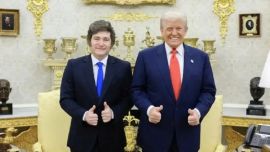Despite confirming that inflation reached 94.8 percent in 2022 – a rate that ranks among the highest in the world and among the past several decades in Argentina – it would still be unfair to say that we are worse off than several months ago. The sudden exit of Martín Guzmán from the Economy Ministry sparked a dangerous move in macroeconomic variables that included runaway inflation as foreign exchange reserves dwindled and the spectre of another major crisis loomed. Today, Sergio Massa is taking a victory lap, claiming to have been responsible for weathering the economic storm in order to end the year without the constant feeling of impending doom. Yet the situation remains absolutely precarious, with several economists warning things could get out of control any moment. We are not walking on the edge of the precipice, but we’re still awfully close, and a small breeze could be enough to destabilise us. Economists, though, are horrible at projections, as Gustavo González loves to remind us.
Massa has always been attacked by his opponents for being an opportunist. From Mauricio Macri’s sticky nickname “ventajita” (which roughly translates to “petty opportunist”) to the notion of “vendehumo” (which suggests everything he says is smoke and mirrors), Argentina’s current ‘super economy minister’ seems to always land on his feet. He was a key member of the Néstor Kirchner administration and then one of the fiercest critics of the Kirchnerites, including Cristina Fernández de Kirchner and her son Máximo Kirchner. He led a “rational” opposition to Macri that helped pass key legislation and even built a centrist coalition to fight against polarisation, before jumping ship to become one of the founding members of the Frente de Todos coalition that put Alberto in the Casa Rosada. Today, holding the economy’s reins, he says all of the things that are politically correct to say.
In a recent interview with Perfil partially translated in this edition, Massa explains that Argentina could have wind in her sails for the next 20 years on the back of multiple exporting sectors that have strong competitive advantages including agriculture, energy, mining, and the knowledge economy. He argues for a fiscally prudent government that seeks to accumulate foreign exchange reserves and claims real interest rates should be positive, multiple exchange rates should be eradicated and the peso-dollar exchange rate shouldn’t generate a pass-through effect that increases inflation and creates a vicious cycle. He appears to have generated an empathic bond with business men and union leaders and is calling for 60 percent wage increases in this year’s collective negotiations. He expects April to arrive with a monthly inflation rate of below four percent.
This sensation that things aren’t that bad could be attributable to Massa’s micromanagement, but it could also be part of a “gradualist” strategy that could blow up in his — and our — face. In a recent analysis for Noticias, economists Marina Dal Poggetto and Sebastián Menescaldi suggested that many of Massa’s wins are actually for the wrong reasons, potentially setting us up for another crisis once the minister becomes unable to pull another proverbial rabbit out of his hat. Inflation, for example, has been falling due to sector-per-sector agreements that are expected to end after the first quarter, and in many cases are accepted by the private sector in exchange for access to dollars at the official exchange rate. The deficit has mainly fallen as a consequence of high inflation diluting government debts and obligations. Monetary financing of the deficit is expected to continue while money printing generates inflationary pressures. They believe there are four key variables that need to be aligned in order for Massa to avoid a sudden shock: a permissive International Monetary Fund allowing the Central Bank to intervene and finance the deficit; the continued support of the private sector and union chiefs; political support from within Frente de Todos; some level of collaboration from the opposition. By March, they expect things to begin to get out of control, sparking a vicious circle that could push inflation to 140 percent in 2023, GDP to contract three percent and the official exchange rate to hit $381.
Who should we believe? Massa or the pessimists? Is he really “selling smoke” or will his piecemeal plan allow economic actors to jumpstart the car and get going? Another interesting position that contrasts with both of these is the hyper-optimism of liberal financial analyst Carlos Maslatón, who claims Argentina is already on an unstoppable bull market that is essentially unexplainable using fundamentals. He points to increased levels of economic activity and consumption. Restaurants are full throughout the country, vacation spots are at record levels of occupancy, companies can’t hire enough skilled workers. Argentine assets are dirt-cheap and they’ve already been on an incredible rally, starting with stocks like national energy firm YPF, which are up more than 350 percent in the past six months. He claims the value of real assets is more important than macroeconomic tendencies and that Argentina is on a multi-year positive circle. Interestingly, he’s currently antagonising his two former “liberal colleagues,” Javier Millei and José Luis Espert, both of whom are predicting a crash.
It’s difficult to take a position based on arguments that are diametrically opposed while both of them are based on the same facts. There is definitely a coincidence between Massa’s arrival to the Economy Ministry and an improvement in certain macroeconomic variables, and probably one of the factors that explain it is reduced political interference by Cristina Fernández de Kirchner and her group of hardliners within the ruling coalition. Guzmán, who initially counted on the vice-president’s support, was slowly chewed down until he hit the eject button and left in bombastic fashion, sparking a serious crisis. While Cristina and her allies have espoused criticism of Massa and his orthodoxy, they’ve pretty much let him do his thing. Talk of a shock stability plan was quickly discarded, and the Economy Ministry appears set on a path of resistance through multiple exchange rates, sector-by-sector negotiations, and the desperate search for dollars. The underlying structural issues can wait for the next government, he says, while claiming he’s not interested in running for president. We’ll see about that.


















Comments